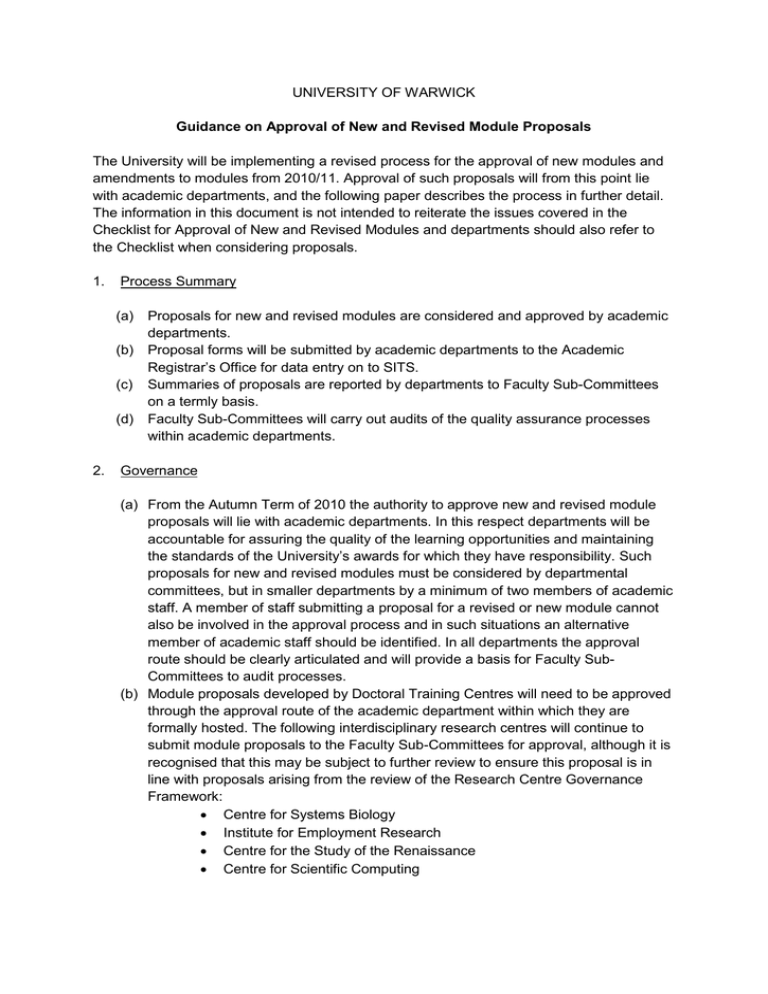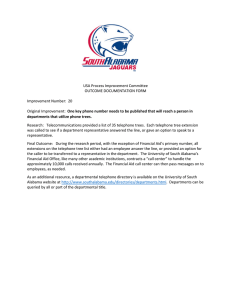UNIVERSITY OF WARWICK
advertisement

UNIVERSITY OF WARWICK Guidance on Approval of New and Revised Module Proposals The University will be implementing a revised process for the approval of new modules and amendments to modules from 2010/11. Approval of such proposals will from this point lie with academic departments, and the following paper describes the process in further detail. The information in this document is not intended to reiterate the issues covered in the Checklist for Approval of New and Revised Modules and departments should also refer to the Checklist when considering proposals. 1. Process Summary (a) (b) (c) (d) 2. Proposals for new and revised modules are considered and approved by academic departments. Proposal forms will be submitted by academic departments to the Academic Registrar’s Office for data entry on to SITS. Summaries of proposals are reported by departments to Faculty Sub-Committees on a termly basis. Faculty Sub-Committees will carry out audits of the quality assurance processes within academic departments. Governance (a) From the Autumn Term of 2010 the authority to approve new and revised module proposals will lie with academic departments. In this respect departments will be accountable for assuring the quality of the learning opportunities and maintaining the standards of the University’s awards for which they have responsibility. Such proposals for new and revised modules must be considered by departmental committees, but in smaller departments by a minimum of two members of academic staff. A member of staff submitting a proposal for a revised or new module cannot also be involved in the approval process and in such situations an alternative member of academic staff should be identified. In all departments the approval route should be clearly articulated and will provide a basis for Faculty SubCommittees to audit processes. (b) Module proposals developed by Doctoral Training Centres will need to be approved through the approval route of the academic department within which they are formally hosted. The following interdisciplinary research centres will continue to submit module proposals to the Faculty Sub-Committees for approval, although it is recognised that this may be subject to further review to ensure this proposal is in line with proposals arising from the review of the Research Centre Governance Framework: Centre for Systems Biology Institute for Employment Research Centre for the Study of the Renaissance Centre for Scientific Computing (c) Departments will need to report their approval processes to the relevant Faculty Sub-Committee at their meetings in the Autumn Term 2010/11 and subsequently report any changes in process. (d) It is recognised that there is currently located within the Faculty Sub-Committees considerable expertise in the scrutiny of module proposals which it will not be possible to reproduce to the same extent in departmental committees at the inception of the process. Departments may therefore wish to consider the membership of their committees to ensure that staff with relevant experience and expertise are included at least in the initial stages of the process. Committees should include the Director of Undergraduate and Graduate Studies (where postgraduate modules are being considered) and their representative on Faculty Sub-Committees if this does not currently include either of these roles. (e) A written record of the approval (including date and approving committee or academic staff) and the final version of the approved proposals should be kept in a central location within the department, both in electronic and hard copy. 3. New Module Design and Approval (a) In addition to the information provided for those involved in the approval process, guidance has also been introduced for members of staff developing module proposals. Clearly this is of a generic nature and departments may therefore wish to supplement this with their own guidance for staff. Departments are also encouraged to have available within departments examples of module proposals of a suitable quality at differing levels of study. Advice can also be sought from the Teaching Quality Office. (b) Prior to module proposals being developed in detail, it is expected that some consideration will have been given to the consistency of the proposal with departmental strategy, although it is not required that this be a formal process. It is recognised that this will already usually take place in departments but the approach will vary. Departments may also wish to consider at this stage the viability of the proposed module in terms of the numbers of students likely to register, and whether there are potential resourcing implications. (c) A checklist of issues that must be addressed in the consideration of new and amended modules has been developed. Approval of proposals should constitute confirmation on the part of the approving body that all items on the checklist have been considered and deemed to be satisfactory. The checklist will also provide a basis for the Faculty Sub-Committees’ audit of departmental processes. (d) Proposals relating to modules taught by staff in more than one department must be approved by the lead department and also signed off by the Heads of the other contributing Departments. 4. Approval of Revisions to Modules (a) Major revisions to modules must be approved using the same mechanism as that for new modules. Major revisions are defined as those which substantially alter the outcomes of the module or those which have an impact external to the department (i.e. on other departments or on University systems). They therefore include the following: A change to module aims or learning outcomes A change to the title of the module A change in the department(s) responsible for teaching the module A change to courses on which the module is available A change to CATS weighting A change to the year of study A change to the availability of the module as core/optional core/optional A change to the teaching and learning methods A change to the assessment methods (b) Departments may determine their approval processes for minor amendments which could include, for instance, changes to reading lists or the syllabus (eg the order in which topics are covered). These processes will need to be clearly articulated within the department. 5. Discontinuation of Modules (a) Modules may be temporarily suspended or permanently discontinued. Suspension of a module for a limited period does not require approval but the Examinations Office should be notified in the annual process of checking module diets in order that the module is not made available to students. (b) If a new module is developed to replace an old one, this will be identified in the module proposal form and the old module will be permanently discontinued. (c) Where a module to be discontinued is not being replaced by a new one the Examinations Office should be notified during the annual process of checking module diets. 6. Role of the Faculty Sub-Committee (a) (b) (c) (d) The Faculty Sub-Committees are responsible for monitoring the assurance of quality in departments. Faculty Sub-Committees will receive a summary report for each module and revision to module approved in departments on a termly basis. This will allow for dissemination of information on new and revised modules but will also provide a means for the Committees to monitor quality assurance. The summary report is the first page of the revised module proposal form. In addition, when new or revised course proposals are submitted for approval, they should be accompanied by the relevant summary outlines of any new module proposals related to the course proposal, to inform the Faculty Sub-Committees’ consideration of the course proposal. Faculty Sub-Committees will also be responsible for auditing departments’ quality assurance processes on a regular basis. All departments will be audited on a 3 yearly cycle, but Faculty Sub-Committees will also have the discretion to hold an audit where they have sufficient concerns relating to quality assurance in departments. 7. Deadlines for Approvals (a) (b) 8. New or revised module proposals to be offered on courses starting at the beginning of the academic year must be approved and submitted to the Strategic Planning and Analytics Office by the end of the preceding Easter vacation to enable the setting up of new modules. Exceptions will only be accepted when modules are being proposed by new staff joining the University after this deadline and where modules have to be amended due to unforeseen changes in student numbers. New or revised modules to be offered on courses that do not start at the beginning of the academic year should be approved and submitted four months prior to the course or year of study commencing. Updating of Systems (a) (b) (c) (d) (e) Information on modules underpins a wide range of the University’s systems, including exams scheduling, module registration, timetabling and resource allocation. In addition it is a fundamental component of the University’s statutory external reporting requirements. The provision of accurate and timely information on changes in the module offering at the University is therefore important. When approved the new and revised module form should be submitted immediately to the Strategic Planning and Analytics Office (SPA.Modules@warwick.ac.uk) which will then distribute the information as required. Strategic Planning and Analytics are responsible for allocating module codes and updating Course Regulations. The Examinations Office are responsible for managing the module registration system (EMR), exams scheduling, the mark entry system and the production of transcripts. Academic departments are responsible for ensuring accurate information on new and revised modules is provided in a timely manner.



